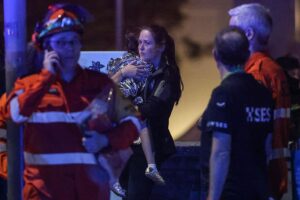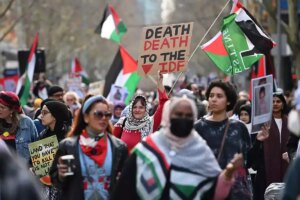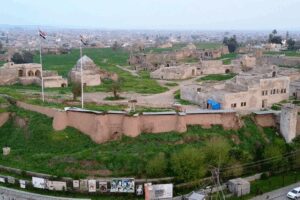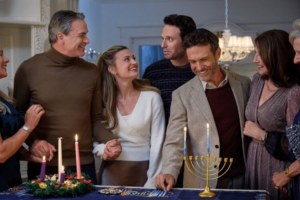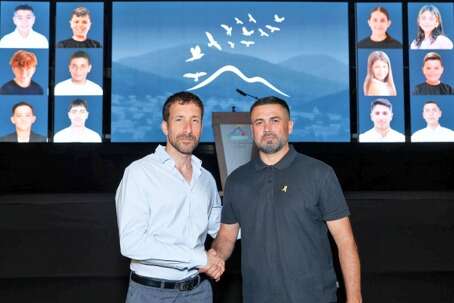
Ask any resident of Majdal Shams where they were on July 27 last year, and they’ll know exactly. The rocket launched from Lebanon turned the Druze town into a scene of devastation, killing 12 children and wounding dozens more. Because the missile struck the town’s hotspot – the soccer field – many people saw it happen in real time.
The UJA-Federation of New York had already been supporting Majdal Shams before the tragedy. However, since then, the organization deepened its involvement. For Itzik Shmuli, UJA’s Director General in Israel, visiting the community the next day was one of the most emotional moments he has experienced. “I met with families, with the local leadership. I came simply to stand with them and share in their immense pain. It’s hard to explain the power of seeing thousands of Israelis arrive to the town, standing silently, respectfully, in mourning. It was a rare and moving scene, one that only strengthened our commitment to this community.”
The Federation’s support before the attack – including to other Druze villages in the north, totaling approximately 6.5 million shekels (roughly $1.8 million) – had already made a significant impact. “This special connection didn’t begin with the rocket and won’t end with it,” Shmuli emphasized. “More broadly, our work with the Druze community is meaningful and ongoing. We play and integral part of Majdal Shams’ ability to rebuild, and that sends a powerful message: We care. We’re here.
“We helped set up emergency medical infrastructure – clinics for evacuation and to provide first aid – which, in hindsight, proved crucial in treating the wounded during the attack. We also supported community resilience and formal and informal education frameworks, as well as initiatives aimed at helping children and teens cope with trauma.”
Laughter, mixed with pain
UJA also partnered with the local government to establish an extensive network of extracurricular programs, enabling nearly every child and teenager in Majdal Shams to take part in meaningful activities, an important step in their healing process. In addition, they back local youth movements, contributing hundreds of thousands of shekels to fund resilience-building programs.
Dolan Abu Salah, head of the Majdal Shams Local Council, praised the unique character of the UJA’s approach: a lack of bureaucratic hurdles that allowed for swift, effective assistance. “They really listen. They ask us to put our needs in writing, and within a few days, we get a response. It’s incredibly rare – precise, timely, and exactly what the community requires.”
The soccer field after the massacre. Photo: Photo: Eyal Margolin – Jini
One of the most moving projects, Abu Salah said, was the establishment of a memorial park for the children who were killed. “It includes a memorial wall, a place for quiet reflection, and a monument. UJA covered a significant part of the cost. I’ll never forget the day Shmuli, together with Eric Goldstein the Federation’s CEO, who flew in from New York, came here to tell us that a grant for the memorial had been approved. Goldstein and Shmuli were in tears. The whole town witnessed this tragedy, the rocket attack happened in plain view of everyone’s homes. Many rushed to the scene and saw horrific sights. Many lost loved ones. And yet, I see how the community is getting back on its feet. There’s mutual support here, and the Federation’s help is enabling us not just to survive, but to grow again. The road ahead is long, but we’re moving forward. Together.”
Shmuli shared what the memorial park meant to him: “I met children here who told us how much it hurt that their soccer field, the heart of their world, had become a place they feared. It used to symbolize joy, dreams, hope. Now it stands for loss. Together with the families and the community, we realized we couldn’t just walk away. We had to bring life back to this place. So we didn’t build a quiet, somber monument. We created a vibrant, living space – one that brings the children back to the heart of the town’s daily life. That was the parents’ wish, and we just helped make it happen. Every ball that rolls across that grass, every burst of laughter, will remind us of the children who never came home. But it also speaks to our society’s strength, to stand up, raise our heads, and keep on living.”
Despite the many efforts, Shmuli does not hold back criticism of those who, before any philanthropic organization, should be responsible for the residents’ welfare.. “The North, especially Israel’s northern regions, has been left behind. We’re not here to replace the government and don’t intend to. But we can be the catalyst that pushes the system forward. Sometimes, when you look at Jerusalem, the picture is disheartening. But when you look within the people, you see amazing initiatives. Jews, Arabs, Druze – everyone is stepping out of their comfort zones, supporting one another. And much of that is thanks to philanthropy.”
The ceremony in Majdal Shams marking one year since the massacre. Photo: Muli Goldberg
Despite the hardship, hope endures
In the wake of the massacre, Majdal Shams’ municipal welfare department sprang into action, and its emergency response continues to this day. Ramez Saad, head of the department, said a local trauma center was immediately established after the attack, and social workers reached out to the families of the deceased and wounded – with each family assigned a caseworker. Representatives from Israel’s National Insurance Institute also assisted with claims, while social service professionals from nearby towns joined forces with the town.
The department launched a 24-hour emergency hotline, visited the homes of residents who had been at the scene, and built a support system not only for those physically injured but also for those emotionally affected. Recognizing that language can be a barrier in therapy, they quickly assembled a network of Arabic-speaking therapists. Alongside numerous community initiatives, the department also took part in “Nur,” an initiative of the Local Council aimed at strengthening community resilience.
Even a year after the attack, residents of Majdal Shams admit the wounds remain fresh. Yet they’re standing firm, clear that hope is rising from the pain. The community keeps holding hands, embracing one another, and slowly piecing together a new way of life.
Local Council head Dolan Abu Salah said, “I’ll never forget the day the UJA team stood here and gave us the news that the memorial park budget had been approved. They cried. This town suffered a deep trauma, but I see how the community is rising. We’re standing tall.”
